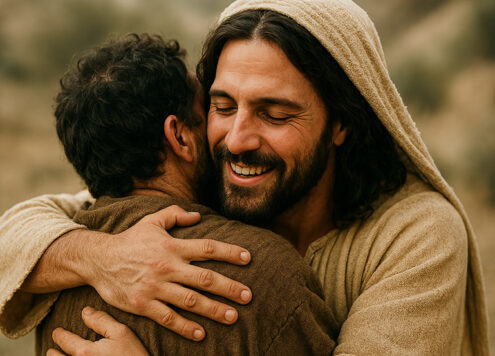It is a cold day in 1942, inside a Nazi concentration camp in Germany, when a young boy looks beyond the barbed wire and sees a young girl pass by. She noticed him too and is moved by his presence. In an effort to give expression to her feelings, she throws a red apple over the fence. The young boy bends over and picks up the apple. A ray of hope had just pierced his darkness.
The following day, thinking he is crazy for even entertaining the notion of seeing this young girl again, he looks out beyond the fence, hoping. On the other side of the barbed wire, the young girl yearns to see again this tragic figure that moves her so. She comes again prepared with apple in hand. Despite another day of wintry blizzards and chilling air, two hearts are warmed once again as the apple passes over the barbed wire. This scene is repeated for several days. The two young spirits on opposite sides of the fence look forward to seeing each other, if only for a moment and if only to exchange a few words. The interaction is always accompanied by an exchange of the deepest, heartwarming feelings.
At the last of these momentary meetings, the young boy greets his sweet friend with a frown and says: “Tomorrow, don’t bring me an apple, I will not be here. They are sending me to another camp.” The young boy walks away, too heartbroken to look back.
From that day forward, the calming image of the sweet girl would appear to him in moments of anguish. Her eyes, her words, her thoughtfulness, her red apple, were a recurring vision of hope that would break his nighttime sweats. His family died in the war, and the life he had known had all but vanished. But this one memory remained alive and gave him hope.
In 1957 in the United State, two adults, both immigrants, are set up on a blind date. “And where were you during the war?” inquires the woman.
“I was in a concentration camp in Germany,” the man replies.
“I was in a concentration camp also” says the woman, “and I remember I used to throw apples over the fence to a boy who was in the opposite section of the camp,” she recalls.
With a feeling of shock, the man speaks. “And did that boy say to you one day: ‘Don’t bring an apple anymore because I am being sent to another camp’?” “Why, yes,” she responds, “but how could you possibly know that?”
He looks into her eyes and says, “I was that young boy.”
There is a brief silence, and then he continues, “I was separated from you then, and I don’t ever want to be without you again.” There and then, he asks her to marry him. They embrace one another as she says, “Yes.”
The most fortunate couple in today’s story have been married for just over sixty years, proving once again that miracles do happen. Our darkest moments, in God’s plan, are often the seeds of the brightest tomorrow.











4 Comments
Phyllis H.
How I LOVED this story of Our Lord’s Divine Providence !!! I, too, have been married since 1957 and blessed to still have my dear husband. GOD IS GOOD!!!!
Hugh Duffy
Congratulations on your long and happy married life, Phyllis. God was watching over both of you.
Sam Moore
This is a beautiful story, Fr. Duffy. Thank you for sharing. These kind of miracle stories have the effect of forcing me to examine my deeply-rooted skepticism and the compulsion to rationalize everything. If nothing else, it helps keep me honest about my spiritual condition.
Hugh Duffy
Sam: Thanks for your provocative comment about the benefit you derive from my ‘Little Miracle’ stories. It’s good to know how you’ve been touched.